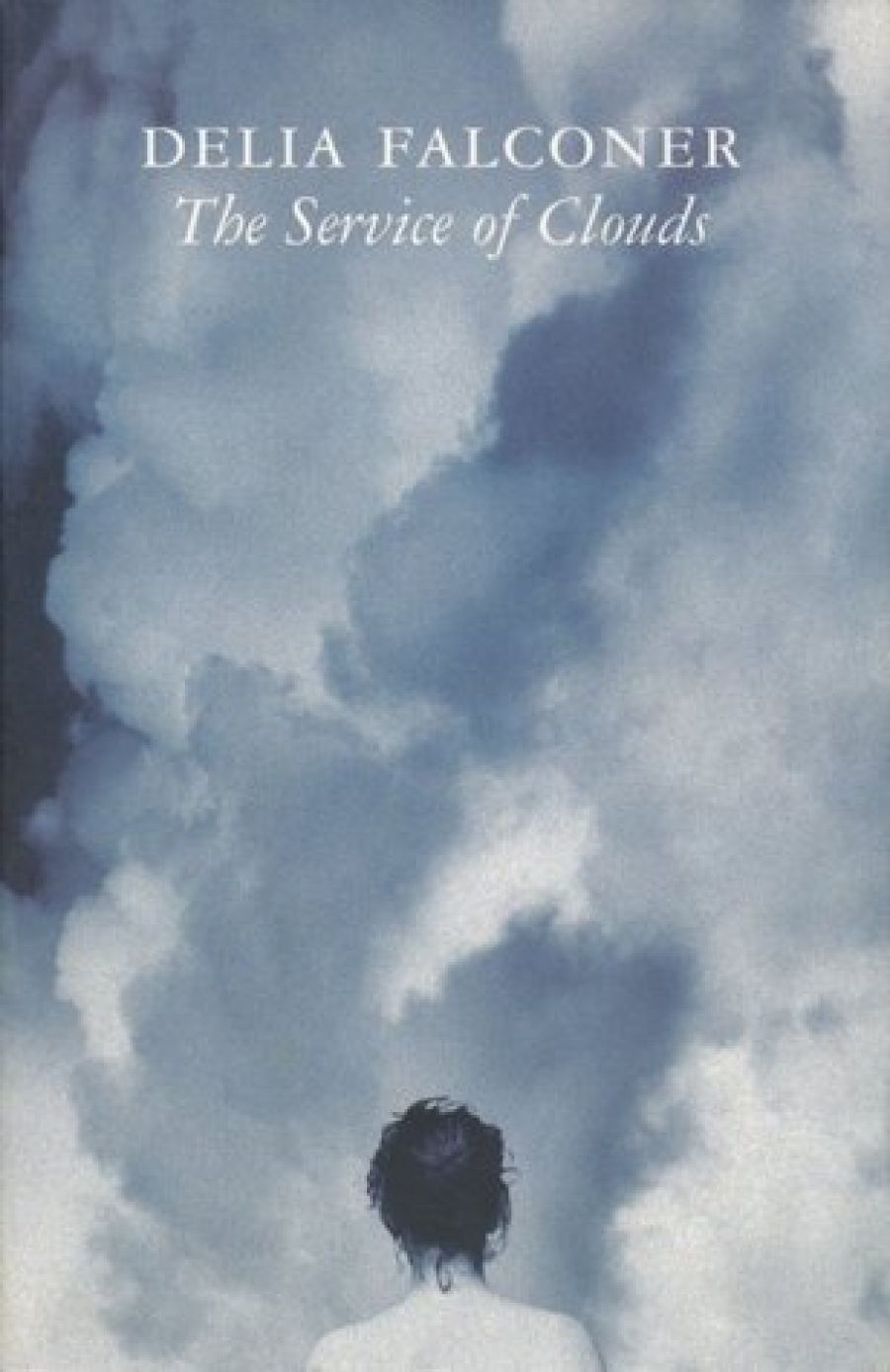
- Free Article: No
- Contents Category: Fiction
- Review Article: Yes
- Online Only: No
- Custom Highlight Text:
This novel, Delia Falconer’s first, takes the form of a love lament: all about breath in bodies; textures and surfaces; clouds; mountains; photography; colour; gardens; illness. Much more, too, of course, and it is a work that certainly does not warrant such a glib cataloguing of elements and attributes. It is ambitious, and successful ...
- Book 1 Title: The Service of Clouds
- Book 1 Biblio: Picador, $16.95 pb, 322 pp, 0 330 36027 2
Falconer’s prose is dense and dreamy; it is a beautiful book, an exquisitely made thing. The writing is often lushly romantic about learning to see colour and landscape, how to look through the filter of photography, about looking, and looking through other people’s apertures. The punctum, in Roland Barthes’s elaboration, resonating in these descriptions of what is caught in photographs: those prickings that occur beyond an image; the addition, the detail that can fill the whole way that the picture is read. The photographer, Harry Kitchings, carries his legacy of family investment in image-making, and is swept away into the madness of photography. The image is everything; the process of photography has made imprints, impressions, on him in the womb, or so his mother believes: if an image could attach itself to glass or metal, she wondered, could it move through the thinner surface of the skin and leave its residue upon the heart? Had these things made their way into the blood of her strange observant child?
The mother’s own hands, out of enforced photographic work, are imprinted with portraits of families. One of Harry’s hands, crushed in a printing press, bears Biblical text, indecipherable, in Gothic type. Everywhere, images of one sort or another – visual, textual, from memory or history – are imprinted onto bodies. And people are possessed inside, too, and vulnerable to ghosts: Harry to the ghost of his uncle and grandfather, both photographers; Eureka’s two aunts to the ghosts of their seven dead baby siblings.
This Blue Mountains setting holds an abundance, a potential of that fresh air and living so close to the face of God, the salvation of what it carries. There is a local Fresh Air League, operating in a rescue-welfare role to give lucky Sydney children a respite from the dismal nature of city poverty. And in the midst of all this restoration of health there is the site of the agony of the disease of consumption. Eureka shifts from working in a pharmacy to the sanatorium for consumptives at Wentworth Falls, just as Matron Coan moves sideways from being a corsetiere to a nurse, simply another means of disciplining breath. Then the vivid descriptions of consumption, that it was among our clouds that consumptives learned to chew mist instead of words, to grasp love or be smothered by it. The florid detail of the wetness of chests, the waterfalls you could hear if you listened to the chest of a consumptive, the jacaranda flowers delivered out of mouths, bright bloody gifts.
This was the first time I heard that bloodcough which would follow me for the next four years. I thought of birds shaking out damp feathers in the rain ... sodden wings. And the glorious refinement before death, the hyper-aesthesia of the soul, the false cues of bright eyes and colour in the cheeks that brought on urges for exotic travel and sexual congress.
Falconer presents a dazzling, eerie scene of sickness and death and intensity, moving through mist at a time when in other parts of the Mountains there is a diminution of cloud and mist, a thinning out of all of that atmosphere. This thinning corresponds with a leeching of colour in the landscape, described by Harry Kitchings as an overuse – too many Kodak photographs, without artistic integrity, had faded the blue and dried up the streamlets and waterfalls. And there is the historical return of men at the end of the Great War, with different needs now; a concentration on containment, on indoor furniture.
The writing itself is visceral, with images of unfurling lungs and broken, busted-up hearts, dreams that pre-empt the disasters. Les Curtain, gardener, dreams of Nellie Melba singing in the grounds of the Hydro Majestic, so close that he could see ‘her great jaw work around each note ... sinews moved and expanded in her throat beneath the powder’ the night before the beginning of his end in the men’s ward.
The Service of Clouds is a delight to read, but I feel that it will become an even richer work as I sit with it, and absorb its layers, and its grace. The investigations of the genealogies of family, love, mountains. ‘In this first decade of the new century faith was essential in dealings with clouds. They had to be propitiated. My mother, being possessed of a practical temperament, did not use metaphors lightly: she expected them to do a full day’s work.’ In the hands of Eureka Jones and, most particularly, Delia Falconer, we are presented with a fulsome account, full of sadness and sleekness, of fugitive mysteries of clouds and love.


Comments powered by CComment